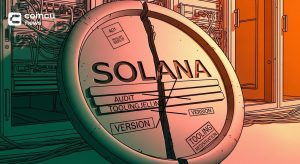Kraken Ethereum Restaking Now Available With EigenLayer Integration
Key Points:
- Kraken now allows users to restake their staked ETH directly through its platform.
- Kraken Ethereum restaking service is available to Kraken Pro users at the Intermediate level or above, though U.S. residents are excluded due to regulatory limitations.
Kraken has partnered with EigenLayer, which allows users of the popular crypto exchange to directly restake Ethereum directly on its platform.

Read more: Select Kraken Lightning Network Is Now Suspended Support For German Client
Kraken Ethereum Restaking Launched via EigenLayer Integration
The newly introduced function, according to an October 15 press release, will grant Kraken clients the capability to restake their ETH that is already staked alongside getting extra rewards through decentralized finance projects on EigenLayer.
Kraken Ethereum restaking service is integrated with EigenLayer protocol, which is built on top of the Ethereum blockchain and allows users to restake their staked ETH for the security of other networks or protocols. This is a process that provides the potential for higher yields with one’s ETH remaining staked, thus further securing many blockchain networks.
Kraken Ethereum Restaking Access Limited to Advanced Users
Kraken Ethereum restaking is now about making yield-generating opportunities more accessible. This, according to a statement from Kraken, sees restaking as “more accessible to a broader range of clients.” The service will create new investment avenues that are now available for Kraken users.
Kraken-owned subsidiary Staked will be the validator for Ethereum restaked on the platform. Rewards from Kraken Ethereum restaking can be kept on the exchange or traded into other cryptocurrencies or fiat currencies.
On the other hand, access to the service is only available to Kraken Pro users at the Intermediate level or higher. In addition, due to regulatory restrictions, U.S. residents are currently precluded from taking part.
| DISCLAIMER: The information on this website is provided as general market commentary and does not constitute investment advice. We encourage you to do your own research before investing. |






















